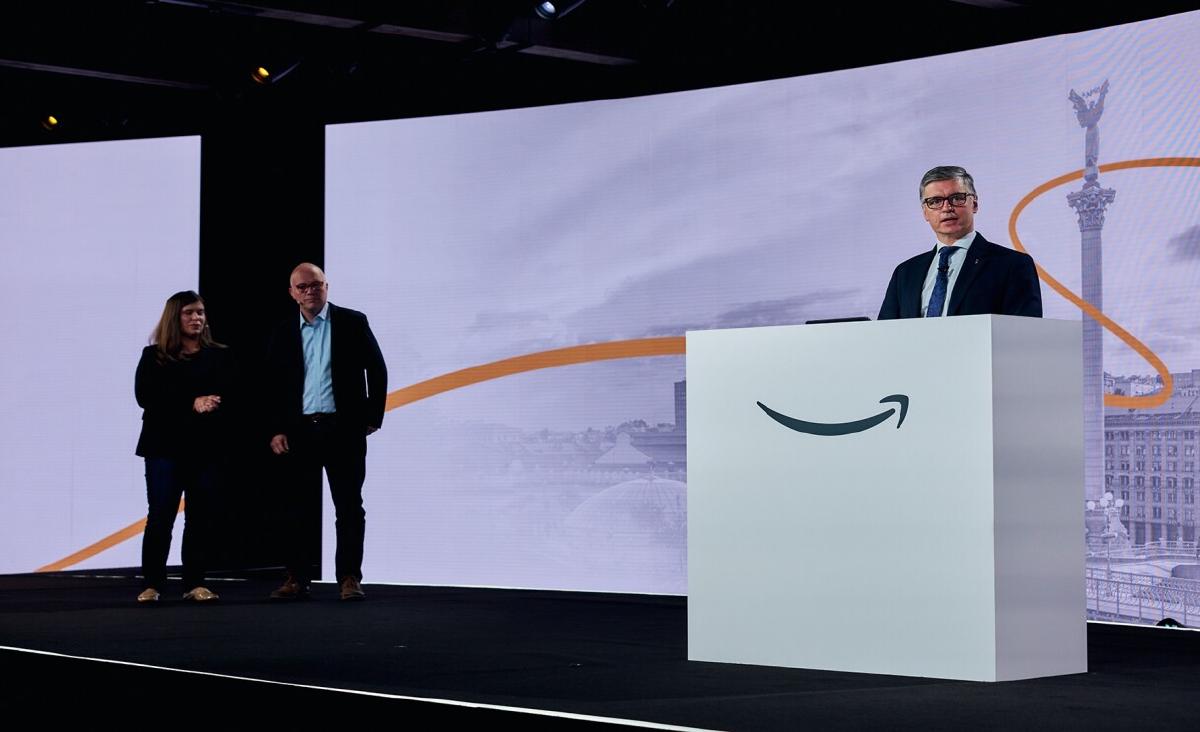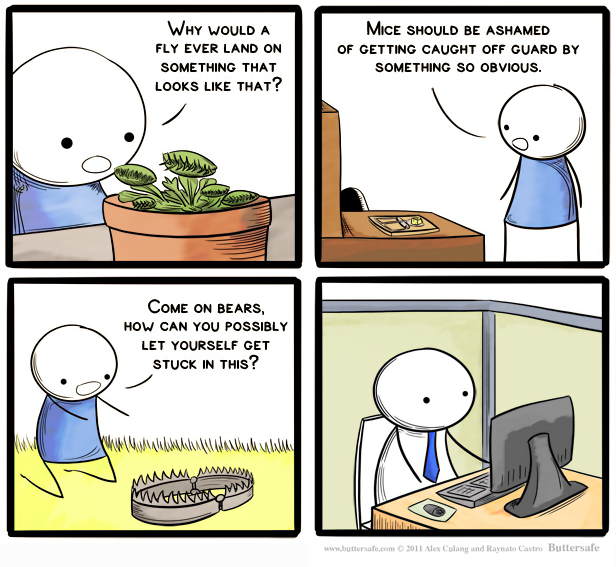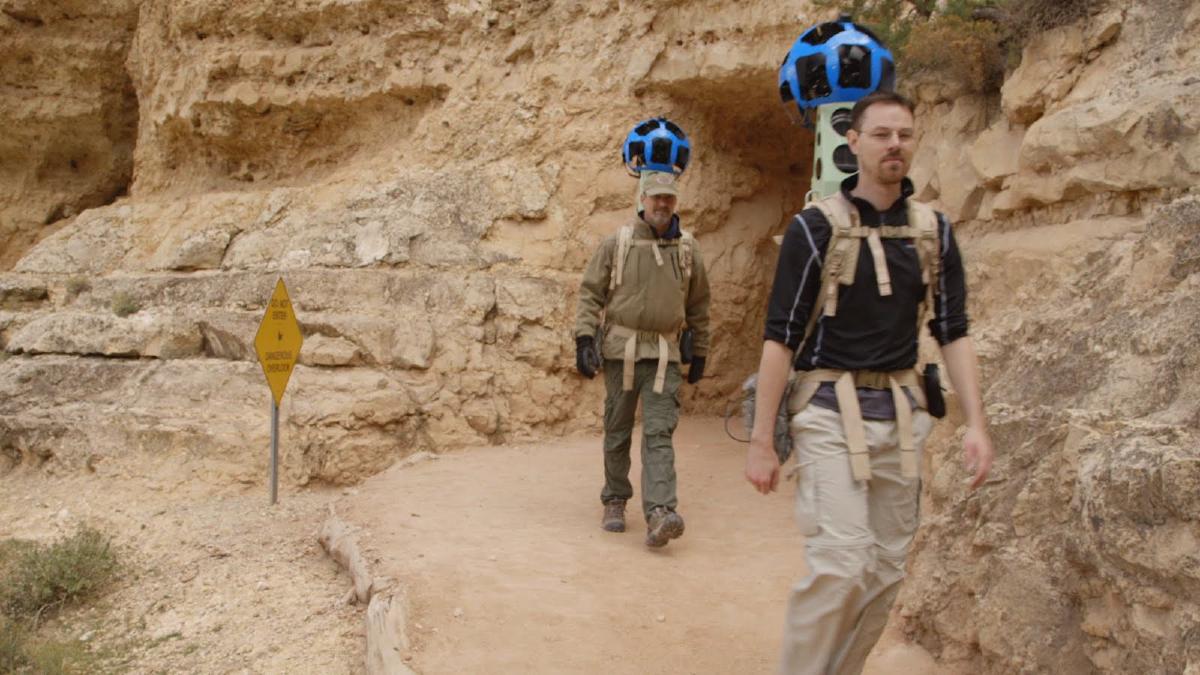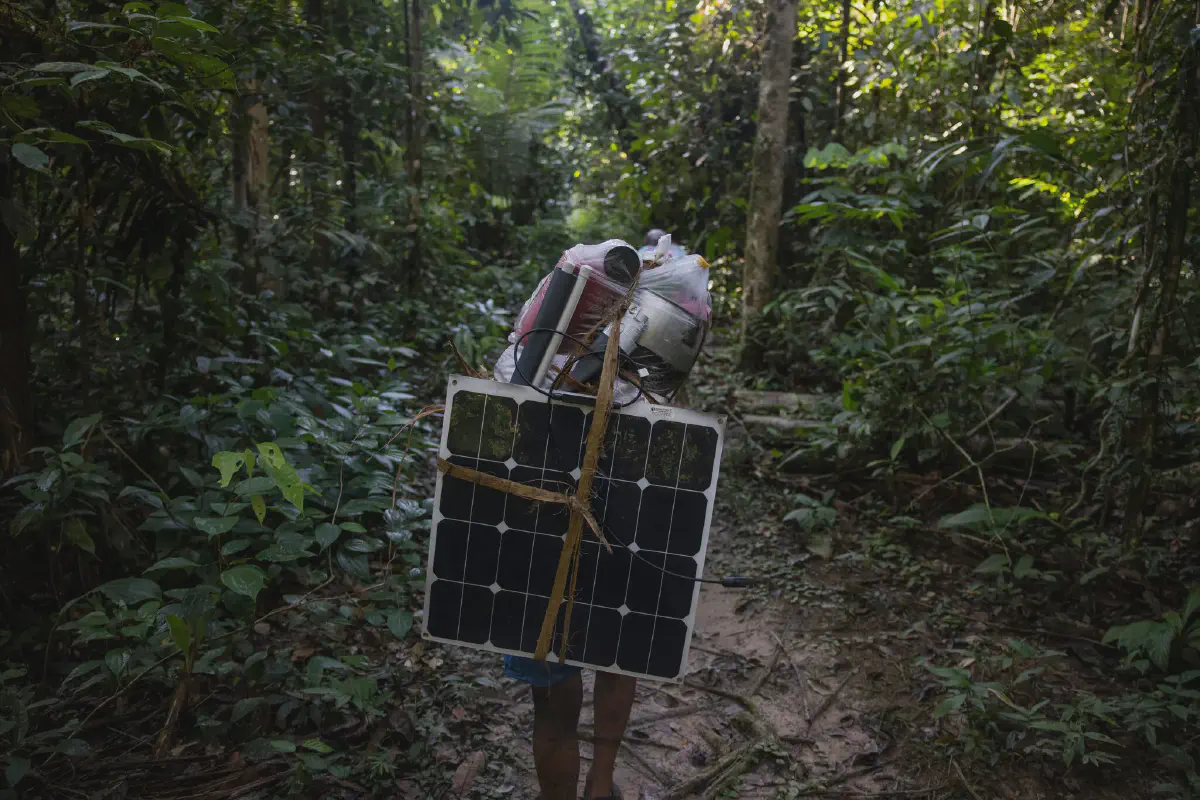Internet Power
Below is the written version of a talk I gave at the Yale Jackson School of Global Affairs on December 10th, 2024. This talk was the culmination of my semester teaching a class called Planetary-Scale Data Institutions at the Jackson School. While my course examined the details of data production and governance, this talk gave me an opportunity to zoom out and examine the overarching impact of the Internet on global governance.
While the Jackson School shared a write up of it (and it was described as “informative, terrifying, and entertaining in equal measure”), the session was not recorded and the talk has never been published until now.
I’m sharing it today because the last six months have reinforced the core thesis of the talk which is that the Internet has enabled the creation of a new kind of power that nation states have failed to grasp. This is not a novel idea and professional scholars have written about this extensively, but I’ve found my conceptualization of the noösphere as a new terrain of governance to be useful.
This talk offers no solutions but instead calls for more scholars and policymakers to think harder about governing the Internet beyond merely regulating technology companies or creating web portals. Governments need to recognize that the winners of the Internet era have created entirely new kinds of businesses rather than merely digital versions of pre-Internet businesses.
Too many governments have wasted decades trying to digitize old modes of service delivery while Internet-native technologies have created entirely new markets and fundamentally altered human behavior. We already find ourselves in a world where many governments are forced to lobby technology companies for favorable treatment, and this fact undermines governments’ attempts at regulation.
21st century institutions need to understand how to accrue and wield their own power on the Internet.
Part 1. Planetary-Scale Data Institutions.
I’m here thanks to Jessica Seddon, Director of the Deitz Family Initiative on Environment and Global Affairs. Jessica was my professor at UCSD, where I got my master’s in foreign policy in 2006. I know I took at least one class from her, but I can honestly say I don’t know what it was. What I remember is that she was the only person on the faculty at UCSD who shared my interest in the Internet and its burgeoning impact on global affairs. And look at us now! She’s been a great friend and collaborator for a long time and I’m very grateful to her for this opportunity. I’ve loved being at Yale and the Jackson school has been so welcoming. It’s been an honor.
My day job is running a nonprofit called Radiant Earth. Our stated mission is to increase shared understanding of our world by supporting community-led initiatives that make data easier to access and use. Shared understanding of planet is essential to any collaboration on global issues and we’re very interested in figuring out, really, practically, how to enable this shared understanding. We can’t agree on ways to regulate greenhouse gasses if we can’t agree on how prevalent they are. We focus on using the Internet to enable cooperation around data in new ways that transcend national boundaries.
I came here to teach a course that I titled “Planetary-Scale Data Institutions.” Thanks to advances in computing, sensor development, rockets, and the Internet, we enjoy continually lower costs of creating and sharing data about our world. This has all happened quite quickly, and we’re still figuring out how to put all this data to work for the public interest, particularly for global challenges such as climate change.
The purpose of the course is to imagine what kind of institutions could reliably produce and distribute data about our planet, as well as what kind of institutions would actually respond to data about our planet.
The truth is that we have very few institutions tasked with merely producing global data for the public interest, and I don’t think it’s controversial to say that many public sector institutions are not set up to make decisions based on data.
Let me make a few caveats about this statement. We have a number of government entities like the EPA and Federal Reserve Board that produce data in order to fulfill specific regulatory tasks. We have operational data programs like many administered by NOAA that produce weather data that are seen as critical to commercial and military operations. And we have plenty of scientific data initiatives from NASA and NIH that produce data merely to accelerate scientific research broadly. These are all US examples, but similar institutions exist around the world.
In some instances, such as satellite data programs, these data are global in nature and are available to users all over the world, but you’ll probably make some NASA executives nervous if you ask them what they think about the fact that China is one of the largest consumers of US-funded satellite data.
Nonetheless, many of these institutions have historically been set up with a narrow set of users in mind – often within their own agencies or within a largely friendly community of researchers. Given the fact that these are tax-funded programs, there’s an implicit understanding that their primary audience is local and not global.
Suddenly, however, demand for data is exploding due to the advances in connectivity and computing power that I just mentioned. I spent about 8 years of my career at AWS helping many of governments share data in the cloud because they suddenly found themselves overwhelmed with interest from data users around the world.
While governments have worked to figure out how to use the Internet to share data, commercial enterprises have sprung up dramatically quickly based on their ability to harness data over the Internet. Google, Amazon, Meta, and parts of Elon Musk’s empire are absolutely concerned with the production and exploitation of planetary-scale data – both in terms of producing data about the world and in terms of furnishing the physical infrastructure used to gather, store, analyze, and transfer data.
My students and I have spent a lot of time this semester examining these organizations, and while we might not think of them as “institutions,” they have accrued power that puts them on par with many organizations that we do consider to be institutions. These are not simply media or telecommunication corporations to be regulated using 20th century mechanisms. They’re a different kind of actor.
I’m now going to explain why I think big tech companies are a new kind of political actor and I’m going to propose a line of thinking to understand how they’ve accrued the power that they have.
Part 2. Ways to make a living.
Elinor Ostrom won the Nobel Prize in economics in 2009 for her analysis of how communities manage “common pool resources.” Her work has been very useful to me as I’ve spent my career trying to figure out how to create shared data resources. Ostrom was an incisive thinker. She wrote a book called Governing the Commons in 1990. In the first chapter of it, she exposes the idea of the “tragedy of the commons” as something of a myth, explaining that there’s plenty of evidence of humans all over the world who have figured out how to share limited resources with one another without relying entirely on centralized state oversight or subjecting resources to market forces.
She was skeptical that we have to make a choice between public or private governance of resources. Her research focused on finding examples of humans cooperating and then trying to figure out the conditions in which they did it – her ambition was to find things that worked in practice in hopes that we could study them and learn how they worked in theory.
One of her insights that I’ve found intriguing is her insistence that we pay close attention to individual humans’ behavior as they cooperate. This is from Governing the Commons:
Many policy prescriptions are themselves no more than metaphors. Both the centralizers and the privatizers frequently advocate oversimplified, idealized institutions – paradoxically, almost “institution-free” institutions. An assertion that central regulation is necessary tells us nothing about how the way a central agency should be constituted, what authority it should have, how the limits of that authority should be maintained, how it will obtain information, or how its agents should be selected, motivated to do their work, and have their performances monitored and rewarded or sanctioned.
I love this. She cuts right to the core of institutional design: institutions are made up of humans and we have to ask a lot of questions about these humans. How do they get their jobs? How are they motivated to work? How are they rewarded or sanctioned? How do they know if they’re accomplishing anything or not?
It just so happens that in 1992, two years after Governing the Commons, another hero of mine, Jane Jacobs, wrote a book called Systems of Survival in which she actually examined these questions about people in different organizations. Jacobs examined news clippings, biographies, obituaries, and job training manuals to study how people get promoted, when they receive public praise from their employers, when they get fired or publicly shamed, etc.
Through all of this, Jacobs comes up with a grand theory based on the idea that humans are unique in that we’ve figured out two ways to make a living: we can take things or we can trade things. Based on this, she posits that humans have created two kinds of organizations: guardian organizations and commercial organizations.
That is, we have organizations that have been built up around the seizure and control of assets, such as governments that oversee territory that has been taken at some point, and we have organizations that have been built up around creating and trading goods, such as most businesses. Jacobs observes that these types of organizations have distinct cultures that attract different kinds of people who generally behave in very different ways – for example, people in governments tend to be risk averse while people in commercial settings may be more risk loving.
The bad news for Ostrom is that Jacobs’s theory indicates that there might be a fundamental reason why we keep reverting to the public versus private sector dichotomy. But! There’s kind of a middle path.
As I mentioned, I worked at Amazon for a little over 8 years, mostly at AWS, the cloud part of the company. While there, I obligated my team into a book club with me in which we read Systems of Survival. We talked about it on a team offsite and I asked them: is Amazon a guardian organization or a commercial organization? We couldn’t answer the question.
Part of the reason it’s hard to answer is simply because Amazon is too large. It’s not just a single entity any more. It contains many organizations, some of which are like startups, some of which are commercial enterprises, and some of which feel like government bureaucracies.
Systems of Survival acknowledges the existence of organizations that don’t fit neatly into either of the guardian or commercial boxes, but Jacobs is leery of them and calls them monstrous hybrids. She uses the mafia as an example of a monstrous hybrid that does a bit of governing while also engaging in a lot of commerce. Bad things can happen when governments get too involved in self dealing and commerce. Bad things can happen when we rely on commercial organizations to govern.
One very broad way to define governance is that it’s the practice of steering humans’ behavior – in fact the word itself comes from the Greek word kubernan which literally means “to steer”. “Good governance” might be defined as whatever steers humans to behave in prosocial ways. Many discussions around “e-government” or “govtech” are focused on ways that governments can use technology to govern. It’s time to acknowledge the fact that tech companies are now governing, whether they intend to or not.
I believe that Amazon and other big tech companies appear to be monstrous hybrids, doing quite a bit of commerce and increasingly steering people’s behavior.
Part 3. Governing in the Internet era.
The question to ask is “how has the Internet created these new governing powers?”
In 2022, the government of Ukraine awarded the “Ukrainian Peace Prize” to AWS, Oracle, and Microsoft for help provided by those companies in the Ukraine-Russia conflict.

I love this image. On the left you have Maggie Carter and Liam Maxwell who both work on the AWS public sector team and who are dressed like Amazon people (although Liam is the former first CIO of the UK government). At the austere Amazon-branded podium is the Ukrainian ambassador to the UK, who’s dressed like a European diplomat.
What happened is that Ukraine, finding itself unable to secure its physical data infrastructure, was able to marshal the support of tech companies that could mobilize resources to prevent cyber attacks and securely migrate critical government communication infrastructure out of Ukraine. Thanks to their help with this, big tech won a peace prize, I would say deservedly!
Providing and controlling communication networks has always been an essential component of governance. Congress’s power to establish the postal service – which is a communication network – is hard coded into the US constitution.
Humans are social creatures and we have an insatiable desire to communicate with one another and to know things about each other. Society is formed by humans communicating with one another. Humans have an insatiable desire for connection and information – enormous parts of our economy have been built on top of this desire.
In 2017, The Economist declared that data is the new oil. There are a lot of problems with that metaphor, but I think there are definitely parallels between the rise of today’s big tech companies and the rise of Standard Oil. In particular, it’s important to remember that Rockefeller got his start not by selling gasoline, but kerosene for lamps. Big Oil became big because it gave people light – there was even some concern that the electric light bulb would destroy the petroleum industry because its primary function was to help people see for more hours of the day.
I think this helps explain why the Internet is so compelling. Internet-enabled media platforms have managed to capture many many people, pulling them into a world of connected ideas, memes, philosophies, and ideologies. There’s a term for this world: the noösphere which comes from the Greek term for mind: nous.
As a species, we increasingly find ourselves living the life of the mind, but our lives are mediated by screens, which are populated by information that is routed to us by algorithms that are created by business models that deliberately and explicitly seek to capture and hold our attention.
George Dyson is an historian of technology and he put this quite starkly in his book Analogia when he stated that our current advertising-fueled Internet media complex is “an evolutionary system that rewards machines that learn to control both how we feel and what we think.”
Because it’s 2024, I’m obligated to mention AI here. Suffice to say that generative AI is guaranteed to compound the effects of all of this.

Comic by Buttersafe
To go back to Jane Jacobs’s theories of how humans can make a living by taking things. The noösphere – the limited volume of human attention – is an entirely new terrain to capture. If you can control what people can see or read, then it follows that you can control what people say or think.
As Jessica said to me recently, whoever gets to describe the status of the environment is who has the power over how the environment is regulated. Multiple studies have shown that people’s perception of climate change is largely informed by their political beliefs. That is, while two people might experience a remarkably warm winter, their beliefs about the implications of a changing climate is determined by their political beliefs.
A big problem with this situation is that nothing about this arrangement favors the distribution of accurate information or promoting prosocial behavior. It’s a system that, quite simply (however cynically), favors capturing humans’ attention and steering their behavior in favor of whoever’s done the capturing. It’s a pied piper situation.
Twitter was not the most popular or successful social media platform by any metric. But it punched way above its weight because it had captured the attention of many journalists and politicians. It became unavoidable in the world of certain people who have outsized influence in powerful institutions.
And, despite this, it didn’t have a great business model and it was vulnerable to being purchased by a single person: Elon Musk. A single person who also owns a constellation of over 6,000 communication satellites.
One way to look at the impact of all this on governments is as an erosion of state capacity: these big tech companies have undermined governments’ capacity and infantilized them. There’s some truth to that, but I think a somewhat more charitable way to look at this is simply that the Internet is an exogenous force that has created a new sphere of governance that can undermine states’ authority.
The Internet is planetary-scale. The US Constitution can authorize the creation of post roads in the land controlled by the US government. It’s much harder for the US to regulate a global network. And unlike oil, data is not a fungible commodity – it’s almost impossible to value data and regulate it using market mechanisms. Like the sea and like the air, the Internet is an arena for the powerful. But it is novel in that it has fostered the creation of entirely new powers.
This is why I think it’s so important to examine the behavior of tech companies. They are insatiable and they’re overtly aggressive. Facebook’s early motto was “move fast and break things.” One of Amazon’s leadership principles is to have a “bias for action.” One of Google’s “10 things we know to be true” is “fast is better than slow.” And Elon Musk just does whatever he wants.
These companies raised enormous volumes of capital in an attempt to shoot the moon – to capture the attention of entire populations. They will attach themselves to humans’ backs, as if we’re pack animals who will carry them anywhere as demonstrated by these photos: one of a technology company hiring staff to acquire data from the Grand Canyon and another of individuals carrying equipment used to connect to the Internet deep in the Amazon rainforest. Most of us won’t leave the house without bringing an Internet-connected device with us. If we’re pack animals, it’s worth considering who or what we’re working for.
Google Engineers carrying Google Street View cameras into the Grand Canyon. From the Google Maps Blog, 2012. A Marubo person carrying a solar panel in the Amazon rainforest. Photo taken by Victor Moriyama for a New York Times story titled "The Internet's Final Frontier: Remote Amazon Tribes"

Part 4. Where do we go from here?
This is a brave new world. One of the questions I want to explore is how nation states can respond to this. Or if they even can.
I wrote a blog post at the beginning of this year called “Unicorns, Show Ponies, and Gazelles” in which I made the case that we should use the Internet to create new institutions that enable good faith actors to cooperate on data services. The gist of it is that Unicorns are big investor-owned and unaccountable behemoths while Show Ponies are mostly useless apps and dashboards that governments produce when pressured to modernize. Gazelles are new kinds of institutions born in the Internet era.
These institutions will look nothing like 20th century institutions. They will not require opulent buildings in DC, New York, or Geneva. They may not have offices at all and they may be ephemeral. I call them gazelles because they should be small, nimble, and intrinsically cooperative. I’ve been very lucky this semester to be working with some very smart students to imagine what these institutions might look like.
Assuming we can maintain an open and mostly neutral Internet, creating new public interest institutions should be possible. The good news about all of this is that the rise of Big Tech has led to abundant access to services that are very good, commoditized, and continually getting less expensive. It is entirely possible to build great public interest tech with existing technology, but we urgently need to find new business models to do this.
I’ve argued that more philanthropic money should be going toward tech-forward initiatives that have much of the DNA of big tech firms, but which are not explicitly designed to grow quickly or become addictive. This, however, requires philanthropic startup capital rather than project-focused grants.
The state’s role in this is to maintain a neutral Internet that cannot be entirely captured to suppress these efforts. It’s entirely within Elon Musk’s power to suppress content on the platform that he owns, so we should be very careful of who gets to make decisions about what is allowed on the entire Internet.
I believe the state also has a responsibility to be smarter about who owns the digital platforms that they endorse. I personally helped the US government adopt many social media platforms as they emerged, all of us quite naive about the implications of making the government entirely dependent upon investor-owned platforms to communicate with citizens. I’m not saying governments shouldn’t adopt new technologies, but the state has a responsibility to think through the business models of these firms.
This is not an argument for heavy handed regulation of big tech, but rather an argument against sleepwalking.
Ultimately, I give myself no choice but to be optimistic about the Internet. It’s been a little weird, but I still think it can enable species-scale cooperation among humans if we get it right.
Thanks to the Deitz Family Initiative on Environment and Global Affairs, the Yale Environmental Data Science Initiative, and the Blue Center for Global Strategic Assessment for co-sponsoring this talk. Special thanks to Lynn Overmann and Macon Phillips for joining the talk for a panel discussion afterward.